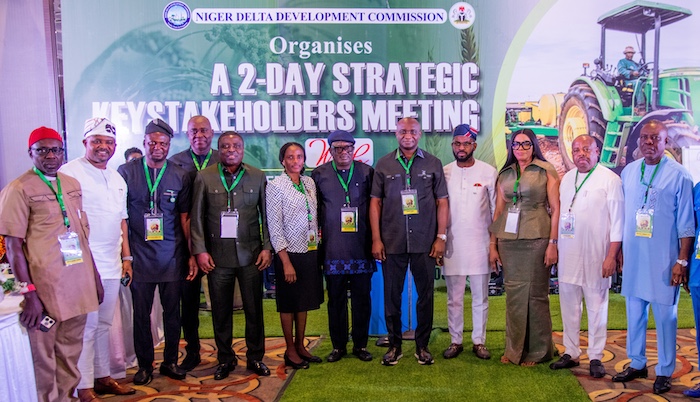
The Niger Delta Development Commission (NDDC) has expressed it’s commitment to transform the Niger Delta region into Nigeria’s food production hub.
This as the Commission organised a two-day strategic retreat tagged “Niger Delta Critical Stakeholders’ Agenda Setting on Unlocking Agricultural Potential of the Niger Delta Region,” in Port Harcourt, Rivers State, yesterday.
In his remarks during the stakeholders retreat, the Executive Director of NDDC, Dr Samuel Ogbuku, has restated will achieve the transformation through sustainable agricultural development and regional collaboration.
He noted that agriculture remained the most sustainable pathway to economic growth, peace, and food security in the region.
Ogbuku stated that before the advent of crude oil exploration, the people of the Niger Delta were predominantly farmers, stressing that a return to agriculture offers a more sustainable and inclusive economic future.
He explained that, “This retreat is aimed at rubbing minds as a people to ensure that there is food security in the Niger Delta so that we can build an agricultural hub that can feed this nation.
We have the potential and comparative advantage in terms of aquaculture. This is the time to make agriculture a cardinal focus of the Renewed Hope Agenda. We must leave a lasting legacy for generations.”
The NDDC boss noted that through agriculture employment will be created and also boost the nation’s economy.
“With agriculture, we can guarantee food export. The NDDC and other partners should come together and see how we can invest in agriculture. We have to take advantage of our blue economy. Let us grow back our staples that have disappeared, such as bananas and cocoyam. Let us, in this retreat, develop a workable framework. For us in the NDDC, we are committed to making history.”
The NDDC Chief Executive also disclosed that the Commission is in discussions with the Origin Group to explore a partnership that would establish a regional food hub in the Niger Delta.
He said the initiative aims to integrate agricultural value chains and promote large-scale food processing and export.
Earlier in his opening remarks, the NDDC Executive Director, Projects, Dr Victor Antai, described the gathering as a “call to action,” urging stakeholders to take bold and deliberate steps to drive agricultural transformation across the Niger Delta.
He stated: “Today’s gathering is not just another meeting; it is a call to action. Agriculture remains our surest path to inclusive growth, job creation, and food security in the Niger Delta. With vast arable land, rich waterways, and a resilient population, our region has the resources to become Nigeria’s next powerhouse in agricultural productivity.”
Antai further emphasised that the retreat provided a unique opportunity to harmonise efforts among state governments, private investors, research institutions, and youth groups toward a coordinated agricultural transformation plan for the region.
The NDDC Director of Agriculture and Fisheries, Dr Winifred Madume, reaffirmed the Commission’s dedication to conceptualising, planning, and implementing sustainable agricultural and fisheries development projects and programmes across the Niger Delta region.
She noted that these initiatives aimed to enhance job creation, food security, and income generation among farmers and fisherfolk. She further stressed the need for collaboration and partnership with agricultural stakeholders to build farmers’ capacity, promote food sufficiency, and reduce youth restiveness in the region.
The various States representatives at the retreat, pledged their States commitment to continue to sponsor agriculture development, while commending the Commission for it’s vision, especially with plan to make the region hub of agriculture.
The Bayelsa State Commissioner for Agriculture, Prof Tubokiye Sese, reaffirmed his state government’s commitment to ensuring food security.
He explained that the state supports farmers with seedlings, farming equipment, and free land-clearing to enhance productivity and provide its citizens with safe, sufficient food.
Also, in her remarks, the Akwa Ibom State Commissioner for Agriculture, Dr Offiong Offor, stated that the state had a comparative advantage in palm crops and oil production.
She added that the state government was actively encouraging young people to venture into agriculture through various training and empowerment programmes.
Blessing Ibunge



